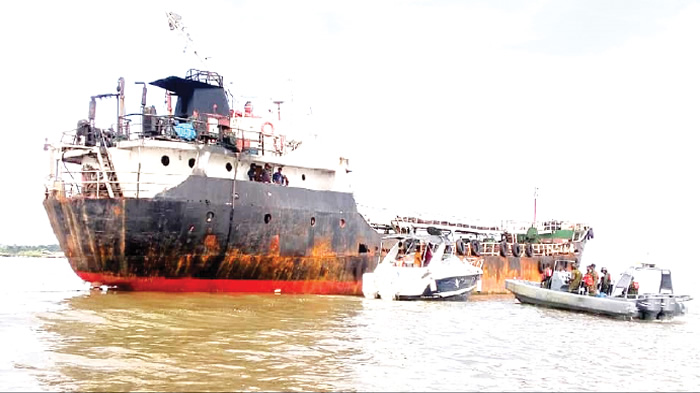
UNDER scrutiny for burning a vessel loaded with alleged stolen oil in the Niger Delta, the Nigerian military is taking umbrage at accusations that it acted in bad faith. Suspicions spiked after the military, in conjunction with a private security outfit, recently intercepted MT TURA II, an 800,000-tonne vessel allegedly carrying 150,000 metric tonnes of stolen crude.
Bizarrely, the military set it and its contents ablaze on July 11 in the waters of Warri, Delta State. Since Nigeria is notorious for industrial-scale oil theft, the ruckus is understandable. The military must explain its actions to Nigerians’ satisfaction and go on to eradicate crude oil theft with transparency and due regard for the environment.
President Bola Tinubu must not remain aloof. Undoubtedly, oil thieves are depriving Nigeria of enormous revenue and rendering it unable to meet its OPEC-assigned quota of 1.8 million barrels per day. The stolen crude was estimated to be just a little short of Nigeria’s average daily production in June put at 1.48 million and by the industry regulator. In an era of acute foreign exchange scarcity and prohibitive debt, this is a lot of money to burn. On Monday, the Nigerian Navy defiantly insisted that it will keep on burning vessels found with stolen oil.
This is freakish and patently irrational. Where in the world does any government recover its own stolen property only to burn it? The burnt crude was valued at $86.8 million.
Essentially, the military accused the operators of MT TURA II of stealing the crude from a terminal in Ondo State and heading for Cameroon with 11 Nigerians and a Ghanaian aboard. The owners were accused of changing the name of the vessel on several occasions. Playing the accuser, judge, and executioner, within four days, the military had burnt the vessel, citing its Standard Operating Procedures that, it said, mandated it to destroy such stolen oil. It is an irrational ordinance and should be dumped immediately. Emmanuel Ogalla, the Chief of Naval Staff, should be told that his defiant insistence on burning recovered stolen property is ridiculous.
Stakeholders, community leaders, and lawmakers have accused the military of a hidden agenda. They allege that it acted precipitately to cover the tracks of the barons behind the oil theft racket.
Indeed, the military’s actions in the Niger Delta and its quirky defence reflect Nigeria’s dysfunctional oil-industry operating environment. This includes the regulator being a player in the downstream, obsolete, idle, and loss-making refineries that necessitate the importation of white products and dodgy accounting.
It also reflects how after decades of task forces, huge funds and multiple operations, the military has failed woefully in ending the massive oil theft in the Niger-Delta. Allegations of complicity by senior military commanders and security chiefs have been persistent and credible. In August 2022, a vessel, MT HEROIC IDUN, was impounded with three million barrels of stolen oil taken to Equatorial Guinea after it successfully navigated the Nigerian waters. That vessel loaded for several days unchallenged while the security agencies feigned ignorance.
The Nigerian National Petroleum Company Limited reported 40 cases of crude oil theft between July 15 and July 21; there were also 27 incidents of pipeline vandalism, while 69 illegal refineries were destroyed within the six-day period.
The Nigeria Extractive Industries Transparency Initiative calculated that between 2009 and 2020, Nigeria lost 619.7 million barrels of oil valued at N16.25 trillion to theft. In December, Timipre Sylva, the then Minister of State for Petroleum, put the loss at a stunning 700,000 bpd.
In October 2022, outrage greeted the burning of a vessel, MT DEIMA, allegedly loaded with 1,500 metric tonnes of stolen crude oil, in Escravos, Delta State by the Navy. Therefore, the Navy’s insistence on burning vessels with their stolen crude is indefensible.
Among other ills, the oil-producing areas have suffered from decades of oil spillage and gas flaring. In the 17 years to July 2022, the volume of oil spilled was 754,196 barrels, revealed the National Oil Spill Detection and Response Agency. Gas flaring costs Nigeria $2.5 billion annually, Tajudeen Abbas, the Speaker of the House of Representatives, added.
The impact on the environment is devastating – soot, smoke, polluted waters, breathing problems, heat and depletion of the ozone layer. In 2016, former President Muhammadu Buhari launched the Ogoni remediation plan at a cost of $1 billion.
Burning the vessel and its contents makes it difficult to prosecute the arrested suspects and vessel owners because the evidence is now buried in the river bed. A Bayelsa State monarch and author of The Riddle of the Oil Thief, Bubaraye Dakolo, insisted that the military deliberately burnt the evidence to prevent investigators from unearthing the real barons behind oil theft in Nigeria.
In June, Asari Dokubo, a former militant, had also sensationally accused the military of abetting oil theft; “99 per cent” of oil theft, he alleged, was perpetrated by the military. The immediate past Rivers State Governor, Nyesom Wike, had similarly accused the military and the other security agents of being knee-deep in oil theft.
Tinubu must therefore move in and clear the mess. Any law or regulation that authorises the military to set these ships ablaze should be swiftly abrogated because it is draconian, short-sighted and further damages the environment.
Instead, Tinubu should sign an executive order mandating that the seized vessels and the contents be preserved as evidence for the prosecution of the culprits. Nigeria’s main source of revenue remains oil exports; it therefore defies logical reasoning to destroy the stolen crude. Instead, it should be forfeited to the state and sold.
Tinubu should learn from Saudi Arabia, the world’s largest oil exporter. A 2008 CBS documentary revealed how the Saudis monitor the oil production there through technology, coordinated by a command centre fitted with a 220-feet digital screen. The operator said, “Every facility in the Kingdom, every drop of oil that comes from the ground is monitored in real-time in this room, and we have control of each and every facility, each and every pipeline, each and every valve in the pipeline. And therefore, we know exactly what is happening in the system from A to Z.”
Nigeria must adopt such sensible options.
There is an urgent need to dismantle the current anti-oil theft security apparatus; its personnel should be completely replaced. The new teams should be closely monitored and given performance targets. Failure should not be tolerated. An intensive intelligence operation should be launched to uncover the criminal networks, identify and apprehend complicit security personnel and oil industry officials.
Burning crude recovered from thieves is sheer lunacy. It should not happen again.





